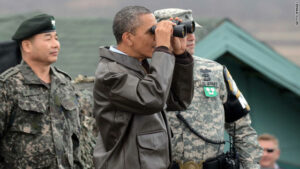(This is section 51 of the World Beyond War white paper A Global Security System: An Alternative to War. Continue to preceding | following section.)

The United Nations is based on the principle of collective security, that is, when a nation threatens or initiates aggression, the other nations will bring to bear preponderant force acting as a deterrent, or as a very early remedy for an invasion by defeating the aggressor on the battlefield. This is, of course, a militarized solution, threatening or carrying out a larger war to deter or prevent a smaller war. The one principal example – the Korean War – was a failure. The war dragged on for years and the border remains heavily militarized. In fact, the war has never been formally terminated. Collective security is simply a tweaking of the existing system of using violence to attempt to counter violence. It actually requires a militarized world so that the world body has armies it can call on. Moreover, while the UN is theoretically based on this system, it is not designed to execute it, since it has no duty to do so in the event of conflicts. It has only an opportunity to act and that is severely enervated by the Security Council veto. Five privileged member states can, and very often have, exercised their own national aims rather than agreed to cooperate for the common good. This partially explains why the UN has failed to stop so many wars since its founding. This, along with its other weaknesses, explains why some people think humanity needs to start over with a far more democratic institution that has the power to enact and enforce statutory law and bring about peaceful resolution of conflicts.
(Continue to preceding | following section.)
We want to hear from you! (Please share comments below)
How has this led you to think differently about alternatives to war?
What would you add, or change, or question about this?
What can you do to help more people understand about these alternatives to war?
How can you take action to make this alternative to war a reality?
Please share this material widely!
Related posts
See other posts related to “Managing International and Civil Conflicts”
See full table of contents for A Global Security System: An Alternative to War








